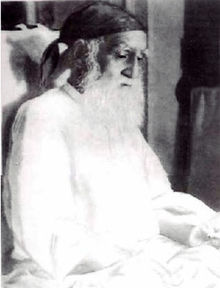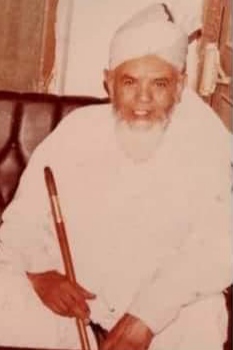
The Chishti order is a Sufi order of Sunni Islam named after the town of Chisht where it was initiated by Abu Ishaq Shami. The order was brought to South Asia by Mu'in al-Din Chishti in the city of Ajmer.

Khawaja Syed Muhammad Nizamuddin Auliya, also known as Hazrat Nizamuddin, Sultan-ul-Mashaikh and Mahbub-e-Ilahi, was an Indian Sunni Muslim scholar, Sufi saint of the Chishti Order, and is one of the most famous Sufis from the Indian Subcontinent. His predecessors were Fariduddin Ganjshakar, Qutbuddin Bakhtiyar Kaki, and Moinuddin Chishti, who were the masters of the Chishti spiritual chain or silsila in the Indian subcontinent.

Uch, frequently referred to as Uch Sharīf, is a historic city in the southern part of Pakistan's Punjab province. Uch may have been founded as Alexandria on the Indus, a town founded by Alexander the Great during his invasion of the Indus Valley. Uch was an early stronghold of the Delhi Sultanate during the Muslim conquest of the subcontinent. It is also known as the home for the Naqvi/Bukhari's after the migration from Bukhara. Uch was a regional metropolitan centre between the 12th and 17th centuries, and became refuge for Muslim religious scholars fleeing persecution from other lands. Though Uch is now a relatively small city, it is renowned for its intact historic urban fabric, and for its collection of shrines dedicated to Muslim mystics (Sufis) from 12th-15th centuries that are embellished with extensive tile work, and were built in the distinct architectural style of southern Punjab.
Naʽat is poetry in praise of the Islamic prophet, Muhammad. The practice is popular in South Asia, commonly in Urdu, Bengali or Punjabi. People who recite Naʽat are known as Naʽat Khawan or sanaʽa-khuaʽan. Exclusive "Praise to Allah" and Allah alone is called Hamd, not to be confused with 'Na'at'.
The Islamia University of Bahawalpur (IUB), formerly known as Jamia Abbasia, is a public university located in Bahawalpur, Punjab, Pakistan. It is the only government university within the division, offering standard education both practical and theoretical.

Pir Meher Ali Shah, was a Punjabi Sufi scholar and mystic poet from Punjab, British India. Belonging to the Chishti order, he is known as a Hanafi scholar who led the anti-Ahmadiyya movement. He wrote several books, most notably Saif e Chishtiyai, a polemical work criticizing the Ahmadiyya movement of Mirza Ghulam Ahmad.
Muftian is a village situated in Tehsil Dina Jhelum District, Punjab, Pakistan.

Shah Abdullah alias Shah Ghulam Ali Dehlavi was a Sufi Shaykh in Delhi during the early 19th century. He was a master of the Naqshbandi tradition His father wanted to make him a disciple of Qādri,.

The Shrine of Meher Ali Shah is a 20th-century Sufi shrine that serves as the tomb of the Peer Meher Ali Shah, an early 20th-century Sufi scholar of the Chisti order, who was also a leader of the anti-Ahmadiya movement. The shrine is located within the Islamabad Capital Territory, in the village of Golra Sharif.
Syed Ghulam Naseer-ud-Din Naseer Gillani was a Pakistani poet and Islamic scholar of the Chishti Sufi orders. He was the custodian of the Golra Sharif shrine in the Islamabad capital of Pakistan. Naseeruddin Naseer was the great-grandson of Meher Ali Shah of Golra Sharif and the son of Syed Ghulam Moinuddin Gillani. He is the nephew of Syed Shah Abdul Haq Gillani.

Peer Syed Ghulam Mohiyuddin Gilani, commonly called Babuji, was a Sufi scholar from Golra Sharif, Pakistan belonging to the Chishti order. He was the son of Peer Meher Ali Shah and remained the sajjada nashin of the Golra Sharif shrine from 1937 to 1974.

Syed Nadir Ali Shah, popularly known as Murshid Nadir Ali Shah, was a Sufi saint of the Qalandariyya Sufi order of Islam, a Muslim preacher, ascetic, mystic, philanthropist and humanitarian. Born in Gandaf in the north-west of the Indian subcontinent, he eventually settled in Sehwan Sharif, Sindh. He was a spiritual descendant of the well-regarded Sufi saint Lal Shahbaz Qalandar and the custodian of the revered Sufi Khanqah, Kafi Sakhi Sarwar located in Sehwan Sharif. Nadir Ali Shah's legacy primarily revolves around his distinction as one of the most remarkable figures among the saints of the Qalandariyya Sufi order. He is renowned for his pursuits in Islamic preaching, mysticism, and asceticism. Beyond his spiritual contributions, he is recognized for his substantial efforts in advancing human welfare and uplifting the underprivileged, in line with the teachings of the Qalandariyya Sufi order of Islam. Notably, he also served as the custodian of the shrine of the Sufi saint Abdullah Shah Ghazi in Karachi.

Ghulam Ullah Khan was a Pakistani Islamic scholar.
Muhammad Alauddin Siddiqui was an Islamic Sufi scholar and social personality.










